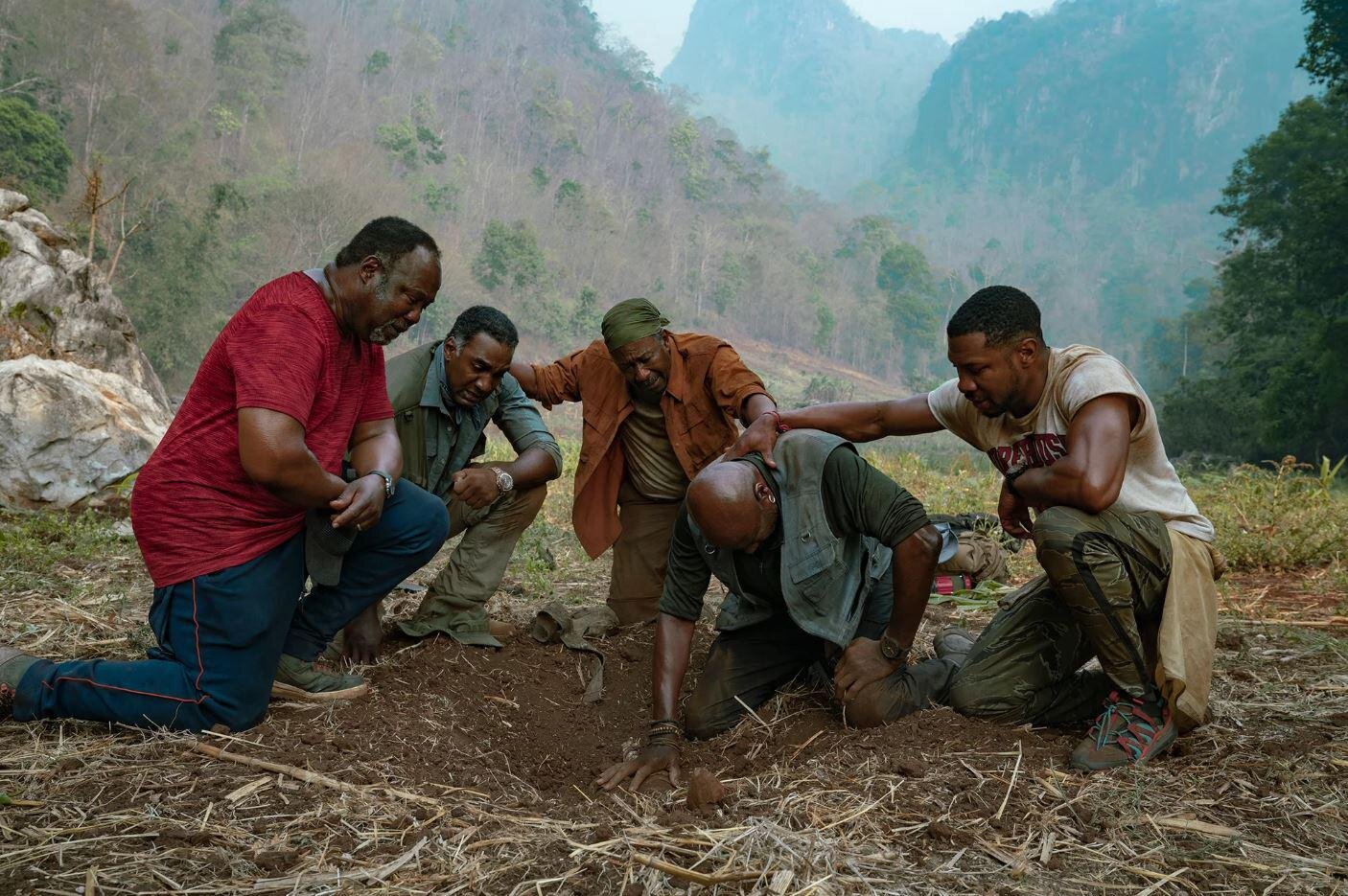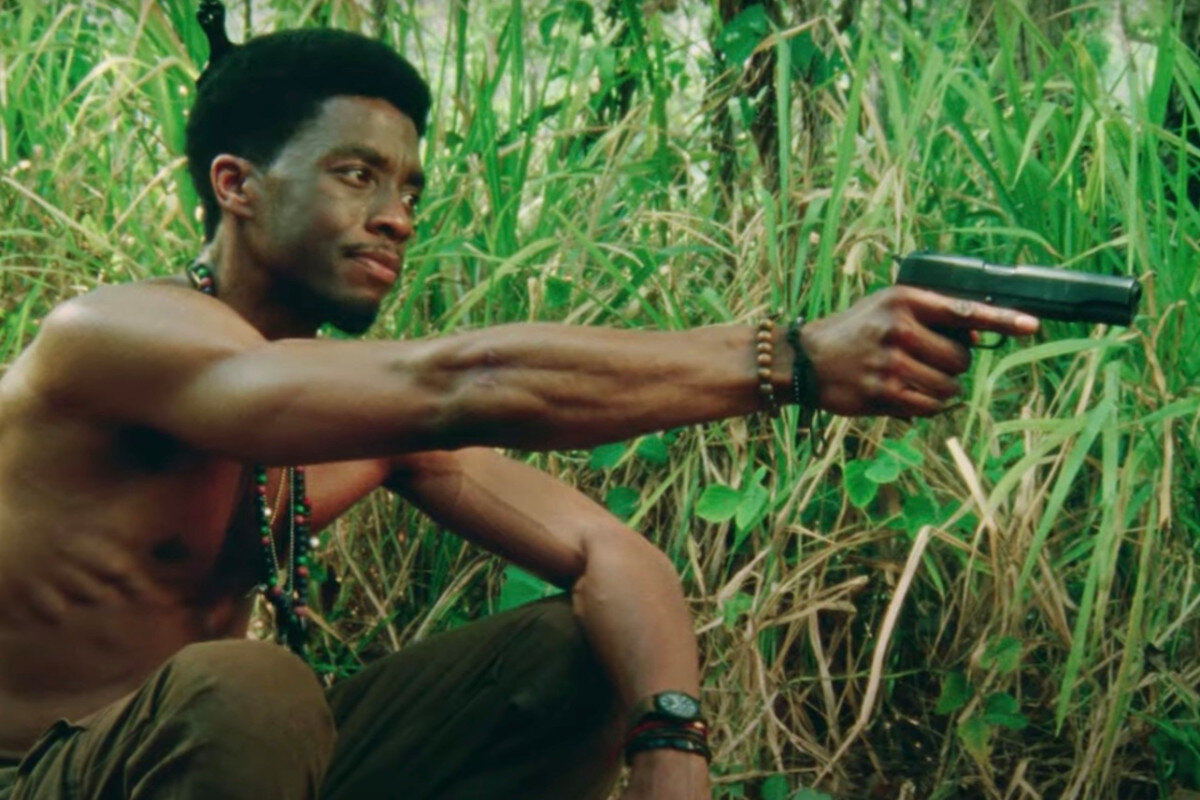REVIEW: 'Da 5 Bloods' is a powerful but fragmented war story
Isiah Whitlock Jr., Norm Lewis, Clarke Peters, Delroy Lindo, and Jonathan Majors in Da 5 Bloods, directed by Spike Lee.
Late in Spike Lee’s new film, two of the titular Bloods - a squad of Black Vietnam vets - comment on how for them, the war never really ended. Like so many soldiers both before and after them, the Bloods may have gone back to the United States and tried to transition to civilian life, but each one was chased by demons and regrets.
One of the squad, Eddie (Norm Lewis), frittered away his hard-earned wealth on failed marriages and bad investments. Otis (Clarke Peters), meanwhile, left behind a relationship with a sex worker (Lê Y Lan) and a daughter he didn’t know about. And perhaps most explosively, Paul (Delroy Lindo) succumbed to anger and fear, spurning his son David and aligning himself with the views and policies of a certain “President Fake Bone Spurs”.
Lee brings these men back together in Vietnam with two goals in mind. First, they want to trek into the jungle to locate the remains of their fallen squad leader Stormin’ Norman (Chadwick Boseman) for a repatriation ceremony. Second, they want to dig up a fortune in gold bars they buried nearby, the result of a failed payment scheme by the CIA to a local tribe.
Lee stirs up a potent blend of ingredients in Da 5 Bloods: a mix of old grievances, sorrow for a lost comrade, the promise of a payday, and most importantly, the overriding trauma of war and the Black experience in the United States. For the most part, Lee hits all his targets, even if he does so in a scattered order. The filmmaker’s trademark messaging is all there, it’s just that the movie’s assembly keeps it from joining the list of Lee’s best work.
Chadwick Boseman as Stormin’ Norman, the squad leader the Bloods lose during a firefight.
Da 5 Bloods hops back and forth in time, showing us flashbacks to the mission that bonded the Bloods for life. We see Norman insist that the money they get for the gold be donated, to charitable causes back home to promote equality, but he’s killed during a firefight before they can fulfill the plan. Nearly fifty years later, the Bloods’ priorities have shifted, and not long after unearthing the treasure, they begin to squabble over the right use for the money, and even begin to suspect each other of plots to steal the entire hoard.
In the film’s most obvious technical choice, Lee decided not to re-cast his core actors or use makeup in the flashbacks. There’s probably another whole essay to write about why Lee didn’t get the kind of budget from Netflix (who financed and distributed the film) that Martin Scorsese did for digital de-aging technology on The Irishman.
But it’s not the presence of middle-aged actors in the period combat scenes that smothers the tension in Da 5 Bloods. It’s a list of smaller choices, subtle details that might be chalked up to style but took me out of the experience. Several characters’ deaths seem to share Tropic Thunder’s taste for comedic violence, applied to moments that are pitched as drama. The soundtrack alternates between patriotic orchestral anthems and R&B, though the tracks often don’t match the expected tone of the scene. A soul track will play underneath a heated discussion or action scene, while some sequences that you’d expect to have a driving, emotional backing are music-free.
This contributes to the feeling that throughout the movie, individual scenes hit hard, but they don’t flow from one to the next. Towards the end, a particularly heated debate between the Bloods leads one of them to knock the other out, and then in the next scene, they’re all walking together as if nothing happened.
Delroy Lindo delivers one of his best performances as Paul.
But if there’s one component holding the movie together, it’s Delroy Lindo’s performance. Lee described in interviews how Lindo initially resisted the idea of depicting Paul as a Trump supporter, but Paul’s self-sabotaging, deeply wounded nature helps explain his politics, even if it doesn’t figure too much into the plot. Lindo is completely believable as a man traumatized by his war experience, who couldn’t acclimate to the real world and build a life for himself, and who is quick to blame others for his misfortune. After spending much of the movie raging at anything and everything, the scene where Paul finally gains a measure of self-awareness and peace is like an ice-cold swim after a sweaty jungle trek.
Just as the movies we watch during the COVID-19 pandemic take on a new context, watching Da 5 Bloods after several weeks of protests about police brutality sharpens Lee’s work even more. The approaches on how to deal with racism are as varied as the film’s characters. For every Eddie - who wants to donate his share of the gold’s value like Norman intended - there’s a Paul, who has given up on challenging the status quo, and simply wants to get what he can, while he can. Many of us will recognize the better path, but the movie’s real achievement is generating empathy for a guy like Paul, as difficult and misguided as he may be.
Da 5 Bloods gets three stars out of four.
Stray thoughts
One of the odd editing choices Lee makes is to extend the shot-reverse shot timing when characters embrace, making a hug look like it happens twice. Still not sure what that one means.
Lee shows off a cheeky sense of visual humour (bright white suit, antique pistol) with the Jean Reno character named Desroches, who I prefer to think of as Monsieur Colonialisme.
The documentary-style photo inserts depicting moments in Black history were jarring at first, but they grew on me over time.




